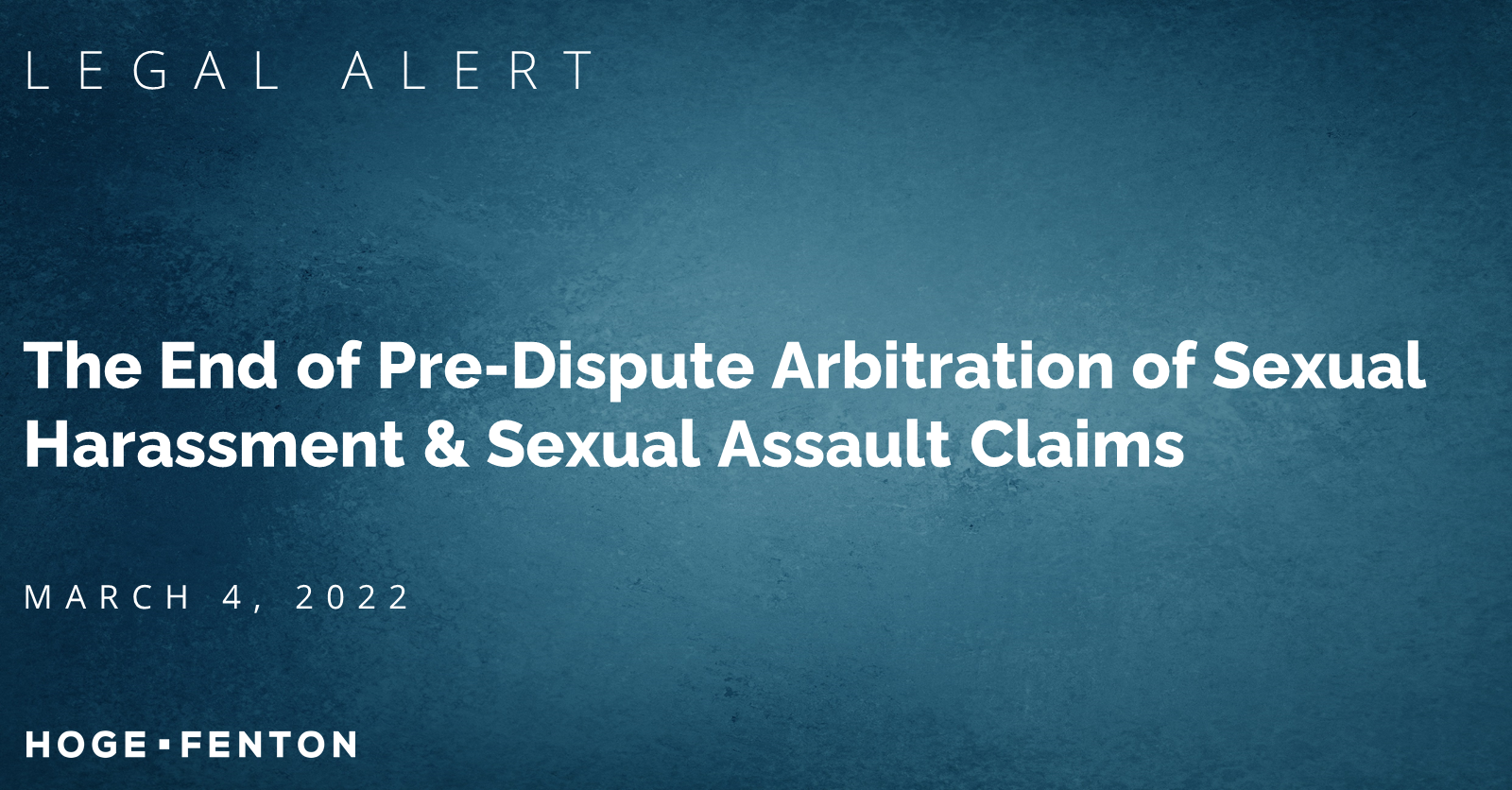LEGAL ALERT: End of Mandatory Arbitration in Sexual Misconduct Cases
By Hoge Fenton | 03.4.2022 | Employment Law

By Jenn Protas and Maysa Saeed
On March 3, 2022, President Biden signed into law the “Ending Forced Arbitration of Sexual Assault and Sexual Harassment Act of 2021” (also known as H.R. 4445). H.R. 4445 amends the Federal Arbitration Act (“FAA”) to prohibit employers from entering into pre-dispute arbitration agreements for claims alleging sexual assault or sexual harassment. It also prohibits employers from including waivers of the right to bring such claims on a joint or class basis.
Background
Arbitration agreements are a useful tool for employers who appreciate that they provide a more private and potentially expedited forum for dispute resolution. And, given the significant uptick in wage and hour class actions in California, arbitration agreements with class action waivers offer a rare and valuable lifeline in prohibiting employees from bringing class-action lawsuits in pursuit of damages on behalf of all other similarly situated employees. Rather, employees who sign arbitration agreements with class action waivers are left with only their individual claims to pursue.
However, as a consequence of the #MeToo movement, both the state and federal governments have enacted laws to restrict employers from silencing employees who are victims of sexual assault and harassment. For example, effective in January 2019, California banned employers from using non-disparagement provisions in agreements to silence employees from disclosing information about sexual assault, sexual harassment, and sex discrimination in the workplace. That law was later broadened in 2022 to prohibit employees from disclosing any unlawful acts in the workplace.
Recognizing that the more private forum of arbitration is sometimes utilized to protect harassers from public scrutiny, H.R. 4445 puts restrictions on employers’ ability to use pre-dispute arbitration agreements for some purposes.
Scope
H.R. 4445 covers all claims of sexual assault or harassment, whether they arise under federal, state, local, or tribal law; the terms sexual assault and sexual harassment are defined broadly to include nonconsensual sexual acts or sexual conduct, including when the victim lacks the capacity to consent. Disputes as to whether a claim constitutes sexual harassment or sexual assault must be decided by courts, not arbitrators, even if arbitration agreements require the arbitrator to decide if the claim falls under the scope of the arbitration agreement. Employers and employees may still agree to arbitrate sexual assault or sexual harassment claims after the disputes arise.
H.R. 4445 is not retroactive; it applies only to claims or disputes of sexual assault or sexual harassment that arise or accrue after the law’s enactment. That said, employers who have, prior to the law’s enactment, entered into arbitration agreements with their employees that require arbitration of these claims or waive the right to bring such claims as a class would not be able to enforce arbitration of such claims or disputes. H.R. 4445 does not affect arbitration of claims that do not involve allegations of sexual harassment or sexual assault. As such, employers are still permitted to use class action waivers in arbitration agreements to limit wage and hour disputes.
Next Steps for Employers
Employers should review and revise any arbitration provisions in their employment-related agreements, such as offer letters, non-disclosure agreements, etc. Hoge Fenton’s Employment Law Group has significant experience drafting arbitration agreements. For more information and to contact Hoge Fenton’s Employment Law Group, click here.
Our Employment Law Group
 |
Sarju Naran (he/him) is a zealous advocate for his clients and approaches litigation with creativity and strategy. Chair of Hoge Fenton’s Employment Law Group, Sarju’s experience spans from representing middle-market and family-owned closely-held businesses to large multi-national companies. He regularly litigates and provides advice and counsel to companies on wage and hour issues, trade secret misappropriation, employee mobility, wrongful termination, performance management, and leaves of absence. |
 |
Jenn Protas (she/her) helps employers navigate California’s numerous employment laws and defends employers with an eye toward successful, yet cost-effective resolution. Jenn is a committed advocate for her clients and a tenacious litigator. She defends employers on matters related to wage and hour law, wrongful termination, harassment, discrimination, and retaliation in single-plaintiff litigation, Private Attorney General Act actions, and/or class actions. Jenn’s practice also includes housing discrimination matters and business litigation. |
 |
Maysa Saeed (she/her) is an associate attorney in Hoge Fenton’s Employment Law Practice Group. Her practice focuses on employment counseling and litigation and assists clients in all aspects of employment law. Prior to joining Hoge Fenton, Maysa was a litigation associate with experience litigating various commercial, employment, and real estate matters. Maysa’s litigation experience provides her with invaluable insight and perspective when advocating and advising clients to resolve or prevent legal disputes. |
This information is provided as an educational service by Hoge Fenton for clients and friends of the firm. This communique is an overview only, and should not be construed as legal advice or advice to take any specific action. Please be sure to consult a knowledgeable professional with assistance with your particular legal issue. © 2022 Hoge Fenton











